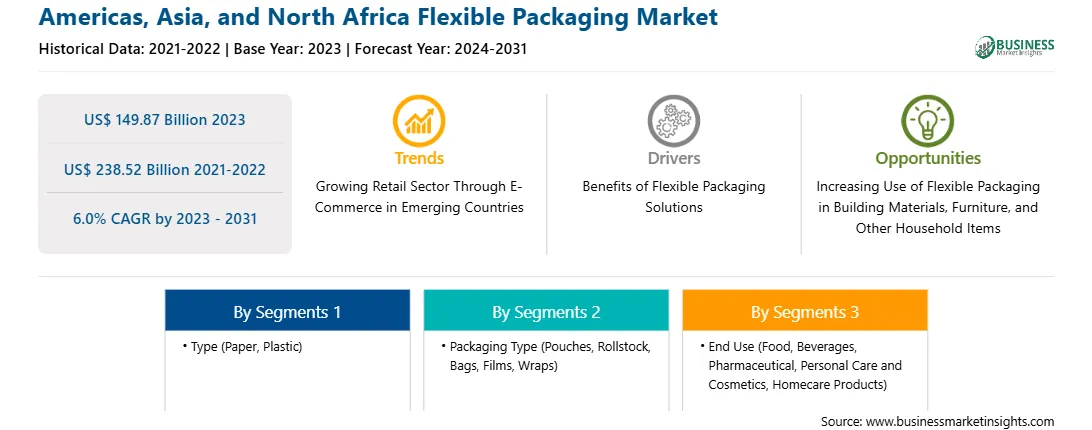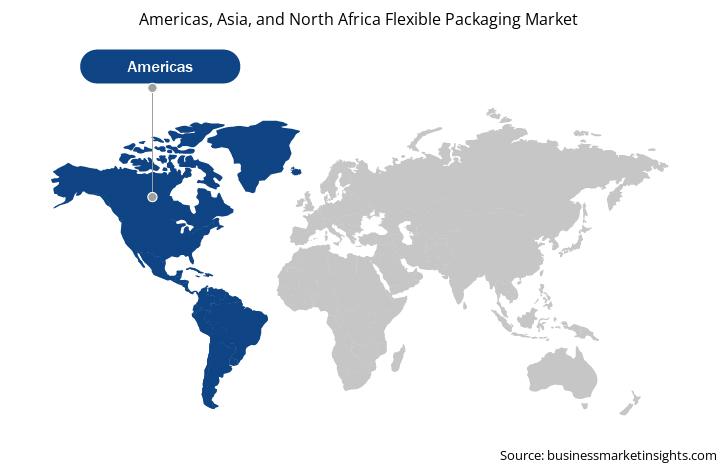The Americas, Asia, and North Africa flexible packaging market size is expected to grow from US$ 149.87 billion in 2023 to reach US$ 238.52 billion by 2031; it is estimated to register a CAGR of 6.0% during 2023–2031.
The flexible packaging market in the Americas, Asia, and North Africa is driven by growing demand in food, beverages, pharmaceuticals, and personal care sectors. The rapidly increasing population, particularly in countries such as India, Brazil and China are pushing the market growth. In the Americas, the shift towards sustainable packaging and increasing consumer preference for convenience have spurred growth. Asia’s market is expanding rapidly due to rising population, urbanization, and growing e-commerce, particularly in China and India. North Africa, while smaller in scale, is witnessing increased demand for flexible packaging in the food and agriculture industries. Across these regions, the focus is on innovation, sustainability, and cost efficiency, making flexible packaging a key growth sector. Additionally, heightened awareness about environmental sustainability is pushing manufacturers to innovate in terms of biodegradable and recyclable packaging solutions. These regions are witnessing advancements in barrier technologies, ensuring product freshness and extended shelf life.
The flexible packaging solutions use non-rigid and flexible materials such as foils, papers, pouches, bags, and other products. These packaging solutions often use less energy in the manufacturing and transportation of the products and generate smaller quantities of greenhouse gases and carbon emissions on their way to market. Packaging solutions such as wraps, bags, and pouches are less costly and occupy 35% less retail shelf space, making them cost-effective compared to other types of packaging. According to the Flexible Packaging Association, manufacturing 780,000 flexible pouches consumes 87% less coal, 64% less crude oil, and 74% less natural gas compared to the manufacturing of clamshell packages.
Waste-to-energy technologies enable flexible packaging producers to turn waste into electricity and fuels. Waste materials can be converted into new products instead of ending up in landfills. European and Asian economies have adopted this method instead of using landfills to discard waste materials. Several advancements in technologies, such as incinerator technology, aiming to reduce harmful emissions, create the likelihood of flexible packaging manufacturing companies adopting these technologies in their manufacturing process.
Flexible packaging protects products from moisture, mold, UV rays, dust, and other environmental conditions that can contaminate them, thereby maintaining their quality and enhancing their shelf life. The aforementioned benefits of flexible packaging solutions drive the flexible packaging market.
The Americas, Asia, and North Africa flexible packaging market report comprises of Amcor Plc, Huhtamaki Oyj, Mondi Plc, Sonoco Products Co, Oben Holding Group, Sealed Air Corp, Transcontinental Inc, Berry Global Group Inc, Constantia Flexibles International GmbH, UFlex Ltd, Coveris Management GmbH, Taghleef Industries, MAM PACK, Videplast, and Safepack, and others as key players that contribute to the Americas, Asia, and North Africa flexible packaging market share across the regions. Players operating in the Americas, Asia, and North Africa flexible packaging market focus on providing innovative and healthy products at affordable prices to fulfill customer demand.
The overall Americas, Asia, and North Africa flexible packaging market size has been derived using both primary and secondary sources in the Americas, Asia, and North Africa flexible packaging market report. To begin the research process, exhaustive secondary research has been conducted using internal and external sources to obtain qualitative and quantitative information related to the market. Also, multiple primary interviews have been conducted with industry participants to validate the data and gain more analytical insights into the topic. The participants of this process include industry experts such as VPs, business development managers, market intelligence managers, and national sales managers—along with external consultants such as valuation experts, research analysts, and key opinion leaders—specializing in the Americas, Asia, and North Africa flexible packaging market.
Strategic insights for the Americas, Asia, and North Africa Flexible Packaging provides data-driven analysis of the industry landscape, including current trends, key players, and regional nuances. These insights offer actionable recommendations, enabling readers to differentiate themselves from competitors by identifying untapped segments or developing unique value propositions. Leveraging data analytics, these insights help industry players anticipate the market shifts, whether investors, manufacturers, or other stakeholders. A future-oriented perspective is essential, helping stakeholders anticipate market shifts and position themselves for long-term success in this dynamic region. Ultimately, effective strategic insights empower readers to make informed decisions that drive profitability and achieve their business objectives within the market.

| Report Attribute | Details |
|---|---|
| Market size in 2023 | US$ 149.87 Billion |
| Market Size by 2031 | US$ 238.52 Billion |
| Global CAGR (2023 - 2031) | 6.0% |
| Historical Data | 2021-2022 |
| Forecast period | 2024-2031 |
| Segments Covered |
By Type
|
| Regions and Countries Covered | Americas
|
| Market leaders and key company profiles |
The geographic scope of the Americas, Asia, and North Africa Flexible Packaging refers to the specific areas in which a business operates and competes. Understanding local distinctions, such as diverse consumer preferences (e.g., demand for specific plug types or battery backup durations), varying economic conditions, and regulatory environments, is crucial for tailoring strategies to specific markets. Businesses can expand their reach by identifying underserved areas or adapting their offerings to meet local demands. A clear market focus allows for more effective resource allocation, targeted marketing campaigns, and better positioning against local competitors, ultimately driving growth in those targeted areas.

The Americas, Asia, and North Africa Flexible Packaging Market is valued at US$ 149.87 Billion in 2023, it is projected to reach US$ 238.52 Billion by 2031.
As per our report Americas, Asia, and North Africa Flexible Packaging Market, the market size is valued at US$ 149.87 Billion in 2023, projecting it to reach US$ 238.52 Billion by 2031. This translates to a CAGR of approximately 6.0% during the forecast period.
The Americas, Asia, and North Africa Flexible Packaging Market report typically cover these key segments-
The historic period, base year, and forecast period can vary slightly depending on the specific market research report. However, for the Americas, Asia, and North Africa Flexible Packaging Market report:
The Americas, Asia, and North Africa Flexible Packaging Market is populated by several key players, each contributing to its growth and innovation. Some of the major players include:
The Americas, Asia, and North Africa Flexible Packaging Market report is valuable for diverse stakeholders, including:
Essentially, anyone involved in or considering involvement in the Americas, Asia, and North Africa Flexible Packaging Market value chain can benefit from the information contained in a comprehensive market report.